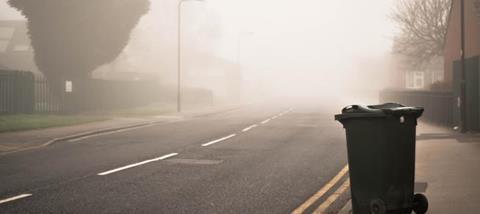
Waste has become such a part of our life that we think it’s normal. We think it’s perfectly okay that to ingest the water we need, we throw away three plastic bottles a day. Or that to eat, we throw away several sheets of plastic with each meal.
Nowadays, all of our most basic requirements - nearly all of our bread, fruit, vegetables, milk and cheese - is wrapped in the stuff. The term for it is 'single use plastic' and it’s everywhere. We also throw away and buy new rather than make do and mend. It’s a huge change to how we live – and the sheer volume of waste we produce is alarming.
One reason I think churches need to really think about this is because we’ve hitched to the waste bandwagon really well. We do large scale catering regularly, using only volunteers, and we often have under-staffed rotas. So using disposable cups, plates and cutlery is really understandable – it seems so much easier. But it’s incredibly selfish to create problems for other people and other generations just to make our life easier in the present, and that’s what our throwaway society is doing. God’s first command to human beings, according to Genesis 1, included the command to look after the earth and its inhabitants.
Somehow as a society we’ve not thought collectively about where all this waste is going or what the consequences are, though paper bags and glass milk bottles being collected and re-used are still within living memory. Perhaps because we can sometimes recycle it, we think it’s okay – or perhaps the reams of environmental legislation lead us to think the situation is taken care of? But the implications are catching up on us. There’s many ways in which it’s seriously damaging the earth, which will already feel the effects for years to come, even if we started radical change right now.
Just look at the plastic rubbish on one tiny little island in the South Pacific that doesn’t have any human inhabitants, yet has collected 18 million tonnes of plastic waste just from the sea, despite being in the middle of nowhere.
The good news is there’s a new movement to try to combat it which involves us ordinary folk taking charge of the issue: Zero Waste – and this week happens to be Zero Waste Week.
I’ve been trying to live like this for a while, and while I’m not at zero, I’m getting there. It’s easier than you think, once you get used to the more traditional ways of living – and there are plenty of tips out there to get started. I produce little rubbish, and what I do is usually recyclable. How do you do it? The only way is to change what you buy, where and when. Stop buying convenience food. Choose fruit and veg that are loose rather than wrapped in plastic. Go to a bakers for bread and put it into your own bag. Consciously buy on the basis of reducing waste, and you’ll be surprised how quickly it can change. And it means fewer 'taking the rubbish out' trips – so there is immediate benefit.
For churches, there’s many ways we can help. Instead of disposable plates, we can make a choice between washing up, or if that’s really not possible, encouraging people to bring their own mugs/cutlery etc to services and events and washing them at home. If your church has a garden, produce your very own holy fertilizer by composting waste coffee grounds and tea bags.
It takes a while to get used to these kinds of changes, but like anything, once it’s routine it’s easy. There are even a few zero waste supermarkets, where you bring your own containers like in ye olde days… If you need help, there are a few groups on Facebook that I’ve found really encouraging and helpful.
I know there’s nothing worse than lecturing, self-righteous activists – forgive us when we become like this! Until a couple of years ago I gave no thought to the amount of plastic I was throwing away. But once you realise how serious the consequences of the throwaway way of living are, it’s the engine for change.




























